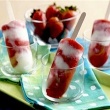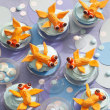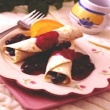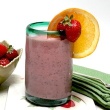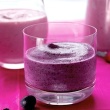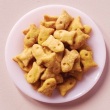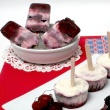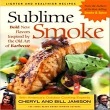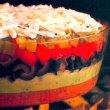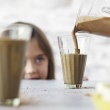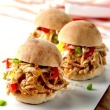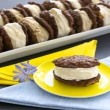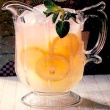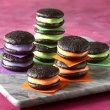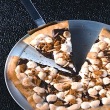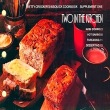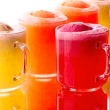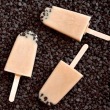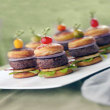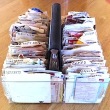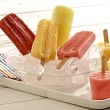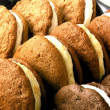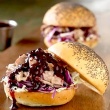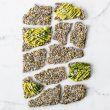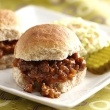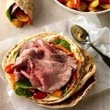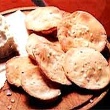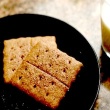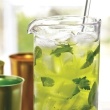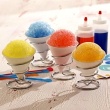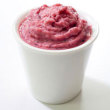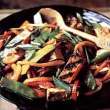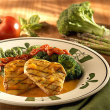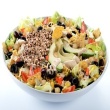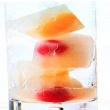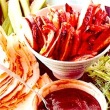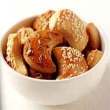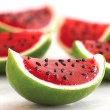Yes, those are fermented pickles. Here is how to make them:
DILL PICKLES
Use the following quantities for each gallon capcity of your container.
4 lbs of 4-inch pickling cucumbers
2 tbsp dill seed or 4 to 5 heads fresh or dry dill weed
1/2 cup salt
1/4 cup vinegar (5 percent)
8 cups water and one or more of the following ingredients:
2 cloves garlic (optional)
2 dried red peppers (optional)
2 tsp whole mixed pickling spices (optional)
Wash cucumbers. Cut 1/16-inch slice off blossom end and discard. Leave 1/4-inch of stem attached. Place half of dill and spices on bottom of a clean, suitable container. For more information on containers see Suitable Containers, Covers, and Weights for Fermenting Food. Add cucumbers, remaining dill, and spices.
Dissolve salt in vinegar and water and pour over cucumbers. Add suitable cover and weight. Store where temperature is between 70 and 75 degrees F for about 3 to 4 weeks while fermenting. Temperatures of 55 to 65 degrees F are acceptable, but the fermentation will take 5 to 6 weeks. Avoid temperatures above 80 degrees F, or pickles will become too soft during fermentation. Fermenting pickles cure slowly. Check the container several times a week and promptly remove surface scum or mold.
Caution: If the pickles become soft, slimy, or develop a disagreeable odor, discard them.
Fully fermented pickles may be stored in the original container for about 4 to 6 months, provided they are refrigerated and surface scum and molds are removed regularly. Canning fully fermented pickles is a better way to store them. To can them, pour the brine into a pan, heat slowly to a boil, and simmer 5 minutes. Filter brine through paper coffee filters to reduce cloudiness, if desired. Fill jar with pickles and hot brine, leaving 1/2-inch headspace. Adjust lids and process as recommended in Table 1 , or use the low-temperature pasteurization treatment described below.
The following treatment results in a better product texture but must be carefully managed to avoid possible spoilage. Place jars in a canner filled half way with warm (120 to 140 degree F) water. Then, add hot water to a level 1 inch above jars. Heat the water enough to maintain 180 to 185 degree F water temperature for 30 minutes. Check with a candy or jelly thermometer to be certain that the water temperature is at least 180 degrees F during the entire 30 minutes. Temperatures higher than 185 degrees F may cause unnecessary softening of pickles.
Table 1. Recommended process time for Dill Pickles in a boiling-water canner.
Process pints 10 min. quarts 15 min. if done in the boiling water bath canner, instead of the low temp. pasteurization.
Adapted from the Complete Guide to Home Canning, Agriculture Information Bulletin No. 539, USDA, revised 1994.
DILL PICKLES
Use the following quantities for each gallon capcity of your container.
4 lbs of 4-inch pickling cucumbers
2 tbsp dill seed or 4 to 5 heads fresh or dry dill weed
1/2 cup salt
1/4 cup vinegar (5 percent)
8 cups water and one or more of the following ingredients:
2 cloves garlic (optional)
2 dried red peppers (optional)
2 tsp whole mixed pickling spices (optional)
Wash cucumbers. Cut 1/16-inch slice off blossom end and discard. Leave 1/4-inch of stem attached. Place half of dill and spices on bottom of a clean, suitable container. For more information on containers see Suitable Containers, Covers, and Weights for Fermenting Food. Add cucumbers, remaining dill, and spices.
Dissolve salt in vinegar and water and pour over cucumbers. Add suitable cover and weight. Store where temperature is between 70 and 75 degrees F for about 3 to 4 weeks while fermenting. Temperatures of 55 to 65 degrees F are acceptable, but the fermentation will take 5 to 6 weeks. Avoid temperatures above 80 degrees F, or pickles will become too soft during fermentation. Fermenting pickles cure slowly. Check the container several times a week and promptly remove surface scum or mold.
Caution: If the pickles become soft, slimy, or develop a disagreeable odor, discard them.
Fully fermented pickles may be stored in the original container for about 4 to 6 months, provided they are refrigerated and surface scum and molds are removed regularly. Canning fully fermented pickles is a better way to store them. To can them, pour the brine into a pan, heat slowly to a boil, and simmer 5 minutes. Filter brine through paper coffee filters to reduce cloudiness, if desired. Fill jar with pickles and hot brine, leaving 1/2-inch headspace. Adjust lids and process as recommended in Table 1 , or use the low-temperature pasteurization treatment described below.
The following treatment results in a better product texture but must be carefully managed to avoid possible spoilage. Place jars in a canner filled half way with warm (120 to 140 degree F) water. Then, add hot water to a level 1 inch above jars. Heat the water enough to maintain 180 to 185 degree F water temperature for 30 minutes. Check with a candy or jelly thermometer to be certain that the water temperature is at least 180 degrees F during the entire 30 minutes. Temperatures higher than 185 degrees F may cause unnecessary softening of pickles.
Table 1. Recommended process time for Dill Pickles in a boiling-water canner.
Process pints 10 min. quarts 15 min. if done in the boiling water bath canner, instead of the low temp. pasteurization.
Adapted from the Complete Guide to Home Canning, Agriculture Information Bulletin No. 539, USDA, revised 1994.
MsgID: 207654
Shared by: Linda Lou,WA
In reply to: ISO: Salty Pickles
Board: Canning and Preserving at Recipelink.com
Shared by: Linda Lou,WA
In reply to: ISO: Salty Pickles
Board: Canning and Preserving at Recipelink.com
- Read Replies (5)
- Post Reply
- Post New
- Save to Recipe Box
| Reviews and Replies: | |
| 1 | ISO: Salty Pickles |
| Denise/WV | |
| 2 | Recipe: Dill Pickles - feremented pickles |
| Linda Lou,WA | |
| 3 | Thank You: Thank You!! |
| Denise/WV | |
| 4 | You are welcome, Denise. |
| Linda Lou,WA | |
| 5 | ISO: will do!!! Another question?? |
| Denise/WV | |
| 6 | re: canning corn |
| Linda Lou, WA | |
ADVERTISEMENT
Random Recipes from:
Preserving - Pickles, Relishes
Preserving - Pickles, Relishes
UPLOAD AN IMAGE
Allowed file types: .gif .png .jpg .jpeg
Allowed file types: .gif .png .jpg .jpeg
POST A REPLY
Post a Request - Answer a Question
Share a Recipe
Thank You To All Who Contribute
Post a Request - Answer a Question
Share a Recipe
Thank You To All Who Contribute
POST A NEW MESSAGE
Post a Request - Answer a Question
Share a Recipe
Thank You To All Who Contribute
Post a Request - Answer a Question
Share a Recipe
Thank You To All Who Contribute

